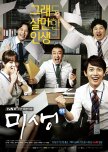Cette critique peut contenir des spoilers
A Profound Journey Through Corporate Realities
Misaeng: Incomplete Life is a Korean drama that left an indelible mark on me with its poignant storytelling and profound exploration of the corporate world. This meticulously crafted series immerses viewers into the tumultuous lives of office workers, shedding light on their struggles, aspirations, and personal growth. From the development of the narrative to the exceptional performances, Misaeng delivers an emotionally charged experience that captivates from start to finish.
The story unfolds around Jang Geu-rae, a former baduk player who finds himself thrust into the cutthroat corporate environment after his dreams are shattered. The drama delicately showcases Geu-rae's arduous journey as he navigates the complexities of office politics, unyielding hierarchies, and the constant pressure to prove his worth. Misaeng's strength lies in its ability to depict the human condition within a sterile and often unforgiving world, striking a chord with viewers who have experienced the challenges of professional life.
One of the drama's standout features is its ensemble cast, whose performances are nothing short of exceptional. Im Si-wan delivers a truly transformative portrayal of Jang Geu-rae, capturing his vulnerability, tenacity, and gradual self-discovery with remarkable depth. The chemistry among the cast members is palpable, creating a sense of authenticity that enhances the storytelling. Each character undergoes substantial development, unravelling their intricacies and internal conflicts, making them relatable and multi-dimensional.
Misaeng's production values are commendable, focusing on the minute details of office life to create a believable and immersive setting. The visual effects, while not particularly flashy, effectively convey the mundane nature of the corporate world, reinforcing the narrative's realism. The series' subdued color palette and understated cinematography contribute to the overall atmosphere, lending a sense of seriousness and introspection to the storytelling.
The drama's original soundtrack is a harmonious blend of melancholic melodies and introspective ballads that heighten the emotional impact of each scene. The music complements the narrative's pace and serves as a window into the characters' innermost thoughts and feelings. Whether it's the haunting piano tunes or the soulful vocals, the OST enriches the viewing experience, further immersing viewers into the characters' emotional turmoil.
While Misaeng shines in many aspects, it does have a few shortcomings. The pacing, at times, can feel slow, especially in the initial episodes, as the story sets up the intricate web of relationships and conflicts. Some viewers may find this deliberate pacing a hurdle to overcome. Additionally, certain supporting characters, although integral to the plot, could have been further developed to maximize their impact.
The story unfolds around Jang Geu-rae, a former baduk player who finds himself thrust into the cutthroat corporate environment after his dreams are shattered. The drama delicately showcases Geu-rae's arduous journey as he navigates the complexities of office politics, unyielding hierarchies, and the constant pressure to prove his worth. Misaeng's strength lies in its ability to depict the human condition within a sterile and often unforgiving world, striking a chord with viewers who have experienced the challenges of professional life.
One of the drama's standout features is its ensemble cast, whose performances are nothing short of exceptional. Im Si-wan delivers a truly transformative portrayal of Jang Geu-rae, capturing his vulnerability, tenacity, and gradual self-discovery with remarkable depth. The chemistry among the cast members is palpable, creating a sense of authenticity that enhances the storytelling. Each character undergoes substantial development, unravelling their intricacies and internal conflicts, making them relatable and multi-dimensional.
Misaeng's production values are commendable, focusing on the minute details of office life to create a believable and immersive setting. The visual effects, while not particularly flashy, effectively convey the mundane nature of the corporate world, reinforcing the narrative's realism. The series' subdued color palette and understated cinematography contribute to the overall atmosphere, lending a sense of seriousness and introspection to the storytelling.
The drama's original soundtrack is a harmonious blend of melancholic melodies and introspective ballads that heighten the emotional impact of each scene. The music complements the narrative's pace and serves as a window into the characters' innermost thoughts and feelings. Whether it's the haunting piano tunes or the soulful vocals, the OST enriches the viewing experience, further immersing viewers into the characters' emotional turmoil.
While Misaeng shines in many aspects, it does have a few shortcomings. The pacing, at times, can feel slow, especially in the initial episodes, as the story sets up the intricate web of relationships and conflicts. Some viewers may find this deliberate pacing a hurdle to overcome. Additionally, certain supporting characters, although integral to the plot, could have been further developed to maximize their impact.
Cet avis était-il utile?

























